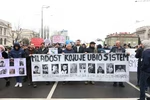
Every second woman in Bosnia and Herzegovina aged 15 and more has been at least once a victim of gender-based violence, it was emphasised during a public discussion on the state of human rights in the sector of sexual and reproductive health and gender-based violence, held in Sarajevo on Thursday.
Enida Imamovic, program analyst for the sexual reproductive health of the youth in the UN Population Fund, warned that these figures should be a trigger to start preventing and combatting gender-based violence.
“According to official statistics, we haven't had cases of maternal death but that doesn't mean we shouldn't continue working on the improvement of health protection in this area but also on the reduction of unfulfilled needs for contraception, because this percentage in the country is nine percent,” Imamovic told the reporters prior to the discussion.
She also said that no country in the world can say it has met all the goals, i.e. that it met three transformative goals known as the three zeros – zero maternal deaths, zero gender-based violence cases and unfulfilled needs for contraception.
“Huge challenges lie ahead of us, it requires joint efforts in order to have the reproductive rights respected and to reach the three zero goals by 2030, which is in line with the sustainable development goals,” underlined Imamovic.
https://twitter.com/UNFPABiH/status/1151798585396269056
Bosnian Ombudsman for Human Rights Jasminka Dzumhur said during the discussion that some parametres show Bosnia will lose more than 40 percent of its current population by 2050.
“This is a result not only of the fact that the death rate is higher than birthrate but also of the issue of migration of people from Bosnia and Herzegovina,” noted Dzumhur adding that these were the key reasons to do research on sexual and reproductive rights, which are directly connected to the population growth.
She explained that the study consisted of two segments, with the first one containing the assessment of legislation and its compliance with the international standards and institutional capacities, and the second one referring to the field research.
“The final mapping shows that Bosnia and Herzegovina significantly adjusted its legislation with the international standards and that it has a good starting position so that there is no much need for interventions,” said the human rights ombudsman.
But, she pointed out the high degree of the lack of preventive action in the segments of sexual and reproductive health.
“The indicators we reached show that a lot more money is earmarked for reaction, when a disease is progressing, especially when it comes to breast cancer and other reproductive organs, while a small amount is allocated for prevention,” said Dzumhur adding that prevention is still a “grey zone” in Bosnia.
Kakvo je tvoje mišljenje o ovome?
Učestvuj u diskusiji ili pročitaj komentare





 Srbija
Srbija
 Hrvatska
Hrvatska
 Slovenija
Slovenija



























































